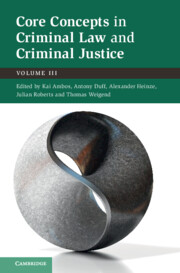
- Publisher:
- Cambridge University Press
- Online publication date:
- July 2025
- Print publication year:
- 2025
- Online ISBN:
- 9781009038126
- Subjects:
- Criminology, Law, Criminal Law, Sociology

Attempts at trans-jurisdictional debate and agreement are often beset by mutual misunderstandings. And while English is the new lingua franca in international and comparative criminal law, there are many ambiguities and uncertainties with regard to foundational criminal law and justice concepts. Professionals and academics engaged in collaborative comparative criminal law projects often do not understand each other, using the same terms with different meanings or different terms meaning the same thing. However, there exists greater similarity among diverse systems of criminal law and justice than is commonly realised. This third volume of Core Concepts in Criminal Law and Criminal Justice explores the principles and concepts that underpin the different domestic systems and rules. It will focus on the Germanic and several principal Anglo-American jurisdictions, which are employed as examples of the wider common law-civil law divide.
 Loading metrics...
Loading metrics...
* Views captured on Cambridge Core between #date#. This data will be updated every 24 hours.
Usage data cannot currently be displayed.
The PDF of this book complies with version 2.1 of the Web Content Accessibility Guidelines (WCAG), covering newer accessibility requirements and improved user experiences and achieves the intermediate (AA) level of WCAG compliance, covering a wider range of accessibility requirements.
Allows you to navigate directly to chapters, sections, or non‐text items through a linked table of contents, reducing the need for extensive scrolling.
Provides an interactive index, letting you go straight to where a term or subject appears in the text without manual searching.
You will encounter all content (including footnotes, captions, etc.) in a clear, sequential flow, making it easier to follow with assistive tools like screen readers.
You get concise descriptions (for images, charts, or media clips), ensuring you do not miss crucial information when visual or audio elements are not accessible.
You will still understand key ideas or prompts without relying solely on colour, which is especially helpful if you have colour vision deficiencies.
You gain clarity from ARIA (Accessible Rich Internet Applications) roles and attributes, as they help assistive technologies interpret how each part of the content functions.